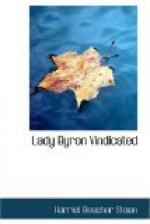The character of the times in which this work was to be undertaken will appear from the following note of Mackenzie’s to ‘The Noctes’ of August 1824, which we copy, with the author’s own Italics:—
’In the “Blackwood” of July 1824 was a poetical epistle by the renowned Timothy Tickler to the editor of the “John Bull” magazine, on an article in his first number. This article. . . professed to be a portion of the veritable “Autobiography” of Byron which was burned, and was called “My Wedding Night.” It appeared to relate in detail everything that occurred in the twenty-four hours immediately succeeding that in which Byron was married. It had plenty of coarseness, and some to spare. It went into particulars such as hitherto had been given only by Faublas; and it had, notwithstanding, many phrases and some facts which evidently did not belong to a mere fabricator. Some years after, I compared this “Wedding Night” with what I had all assurance of having been transcribed from the actual manuscripts of Byron, and was persuaded that the magazine-writer must have had the actual statement before him, or have had a perusal of it. The writer in “Blackwood” declared his conviction that it really was Byron’s own writing.’
The reader must remember that Lord Byron died April 1824; so that, according to this, his ‘Autobiography’ was made the means of this gross insult to his widow three months after his death.
If some powerful cause had not paralysed all feelings of gentlemanly honour, and of womanly delicacy, and of common humanity, towards Lady Byron, throughout the whole British nation, no editor would have dared to open a periodical with such an article; or, if he had, he would have been overwhelmed with a storm of popular indignation, which, like the fire upon Sodom, would have made a pillar of salt of him for a warning to all future generations.
‘Blackwood’ reproves the ‘John Bull’ in a poetical epistle, recognising the article as coming from Byron, and says to the author,—
’But that you, sir, a wit
and a scholar like you,
Should not blush to produce what
he blushed not to do,—
Take your compliment, youngster;
this doubles, almost,
The sorrow that rose when his honour
was lost.’
We may not wonder that the ‘Autobiography’ was burned, as Murray says in a recent account, by a committee of Byron’s friends, including Hobhouse, his sister, and Murray himself.
Now, the ‘Blackwood’ of July 1824 thus declares its conviction that this outrage on every sentiment of human decency came from Lord Byron, and that his honour was lost. Maginn does not undertake the memoir. No memoir at all is undertaken; till finally Moore is selected, as, like Demetrius of old, a well-skilled gilder and ‘maker of silver shrines,’ though not for Diana. To Moore is committed the task of doing his best for this battered image, in which even the worshippers recognise foul sulphurous cracks, but which they none the less stand ready to worship as a genuine article that ‘fell down from Jupiter.’




